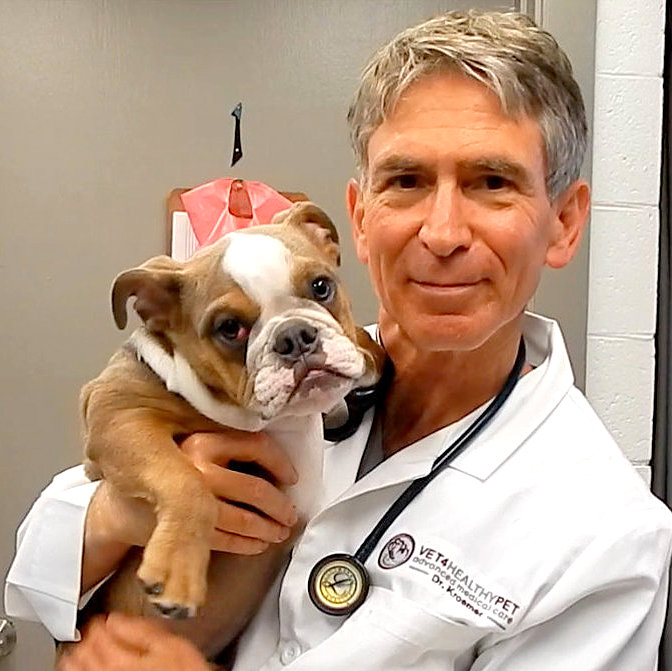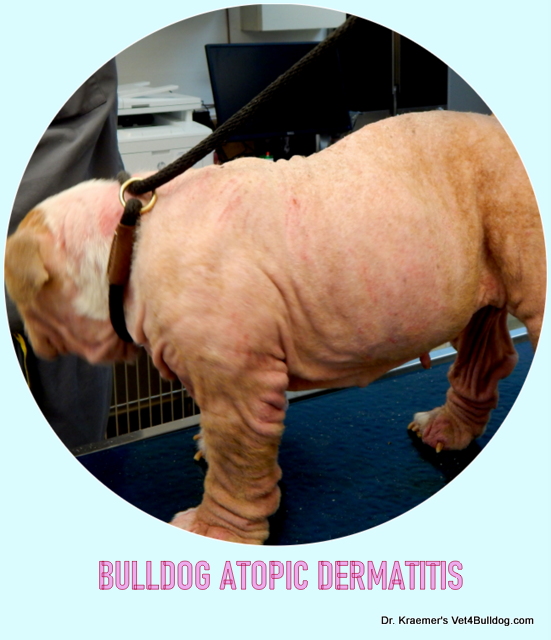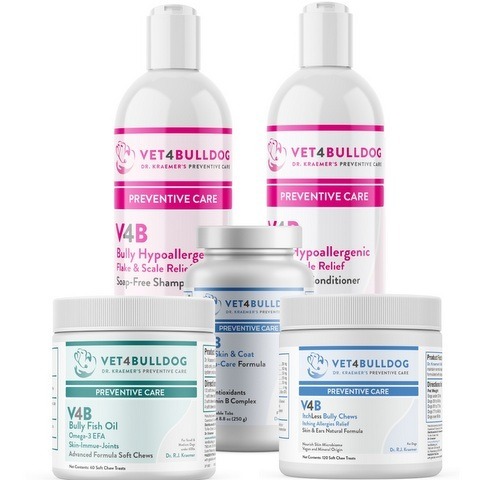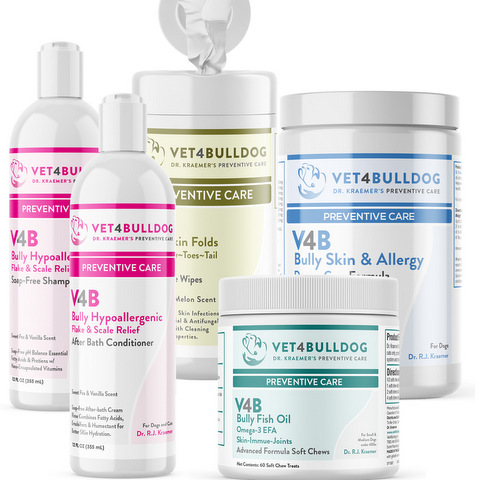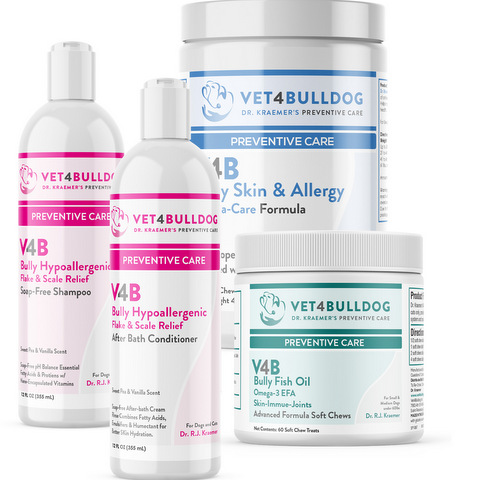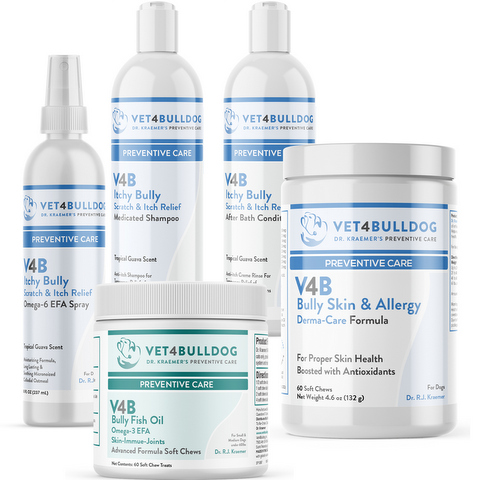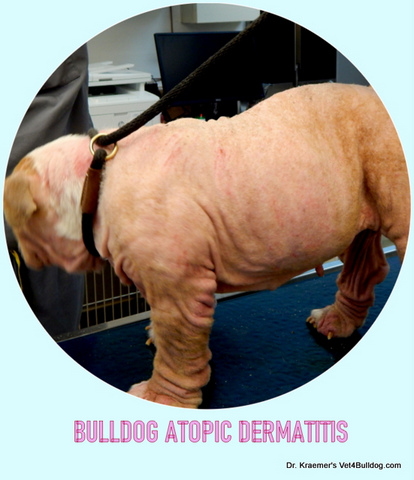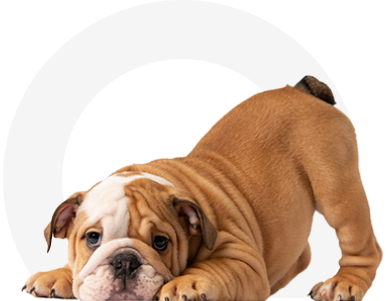Subject: Urgent: Lola’s Itching Allergy Issue 😿
Dear Dr. Kraemer, my French bulldog Lola has started itching like crazy. Her ears, face, and belly are getting tomato-red and bumpy. She seems very uncomfortable. 😢
Please advise on what I can safely give or apply to relieve her.Sincerely, Tina & Lola #PetAllergies #FrenchBulldog #ItchyPet #DogAllergies #PetCare #VeterinaryAdvice
Allergies in Bulldogs and French Bulldogs Introduction:
Itching allergies in bulldogs and French bulldogs are possibly the most common medical conditions presented at my bulldog practice.
WHAT ARE THE MOST COMMON BULLDOG ALLERGIES?
There are a few types of allergies:
- ATOPIC ENVIRONMENTAL ITCH DERMATITIS
- FOOD ITCH DERMATITIS
- FLEA ITCH ALLERGY
- CONTACT ITCH ALLERGY
WHAT SHOULD I DO IF I THINK MY BULLY HAS ALLERGIES?
Bulldog allergy often requires a thorough examination by a veterinarian, including potential allergy testing and a review of the dog’s environment and diet.
Start prevention and care with bully therapeutics to help heal skin damage, hair loss, and microbiome and control itch and allergies
Atopic environmental itch dermatitis is the most common allergy
Bulldog Allergies 5 MUST KNOW
- There are many types of bulldog allergies
- To better prevent and treat it is important to identify the allergy type
- Bacterial and yeast infections are secondary to the skin barrier injuries associated with allergies and itching.
- Washing the allergens off the skin and itch control is essential and should include non-RX bully therapeutics.
- Prevention and care include Dr. Kraemer’s Bulldog Allergy and Itch Control Bundles.
Join Our “Prevention Over RX” Bulldog Community
What Causes Bulldog Allergy and Itching?
Bulldog allergies can be triggered by a variety of factors, including:
1. BULLDOG ATOPIC ENVIRONMENTAL ALLERGY CAUSE:
- Genetic cause: Bulldog Atopic Itch allergy has a genetic predisposition and hereditary underpinning.
- Allergens: tree, grass, weeds, dust mites, mold, etc.
2. BULLDOG AND FR. BULLDOG FOOD ALLERGY CAUSE:
Bulldog Food Allergy is mostly induced by proteins, usually from an animal source
Common Food Allergens:
- Beef
- Chicken &, Turkey
- Fish
- Egg
3. BULLDOG AND FR. BULLDOG FLEA ALLERGY:
Flea Bite: Itching is triggered by a flea bite
Allergic dogs are sensitive to the allergen injected with flea saliva during the flea blood meal.
3. BULLDOG CONTACT ALLERGY CAUSE:
Allergen that comes in direct contact with your pet. Here is a short list of some of the most common ones:
- Pesticides & Insecticides ( flea collars & topical flea products)
- Grass & Lawn ( fertilizers & herbicides)
- Topical medication: flea medication and shampoo
- Bed & Blanket material
What is Itch Bulldog Allergy?
- Self-trauma:
- itching
- biting
- chewing
- licking
- excessive grooming
- Inflammation:
- redness
- rawness
- bumps
- Odor & Discoloration
- Dander & Flakes: Usually dry, flaky skin
Bulldog and Fr. Bulldog Allergy Hair Loss DISTRIBUTION:
Various bully allergies have different typical distributions and appearances
1. FLEA ALLERGY HAIR LOSS DISTRIBUTION
Itching, hair loss, and red bumps, mostly at the distal back and tail base
2. CONTACT ALLERGY BALDING DISTRIBUTION
Itching, erythema (redness), and hair loss at the contact site
Examples are
- Flea collar NECK AREA
- Grass pesticides BELLY AREA
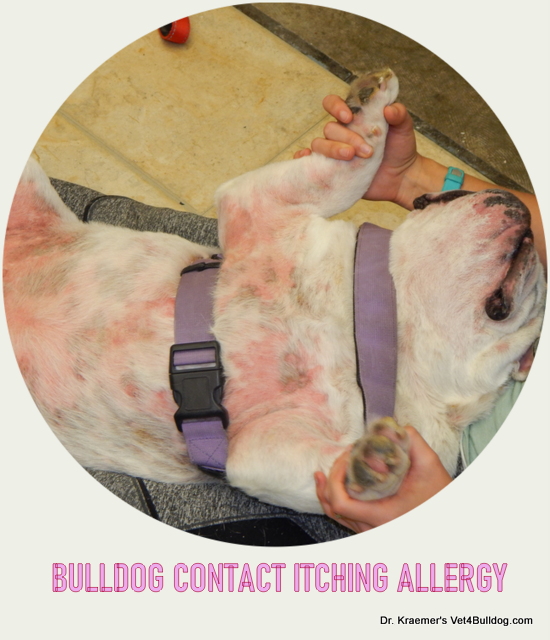
3. ENVIRONMENTAL ALLERGY HAIR LOSS DISTRIBUTION:
Itching and hair loss mostly at the
- Paws
- Ear base
- Belly
- Elbows
- Hind legs
4. FOOD ALLERGY BALDNESS DISTRIBUTION:
Similar to atopic allergic dermatitis.
Itch Allergy in Bulldog and French Bulldog: MYTH & FACT
#1: WARTERY, RED EYES & SNEEZING ALLERGY MYTH
INHALING ALLERGY MYTH:
Most people associate allergies with inhaling allergens, like with hay fever. However, unlike us, bulldogs don’t primarily inhale allergens; instead, these allergens enter through their skin.
- INHALING ALLERGY FACT: Healthy, allergy-free bulldogs have a strong skin barrier that protects them from allergens, keeping them itch-free. Bulldogs with allergies suffer from a compromised skin barrier, making them susceptible to common atopic allergies.
- ITCHING ALLERGY FACT: For us, allergies often show up as red eyes, sneezing, and sniffling, while for bulldogs and French bulldogs, the main sign of an allergy is itching.
That said, some bulldog allergies, like allergic bronchitis and allergic rhinitis, can still cause upper or lower airway issues, such as coughing, nasal discharge, and sneezing.
#2: OUTDOORS vs. INDOORS ALLERGEN MYTH
OUTDOORS ALLERGN MYTH:
Many bulldog owners mistakenly believe that by confining their pets indoors, they can shield them from offensive allergens and consequently prevent allergies. However, this assumption is incorrect.
➡️ ALLERGEN FACTS: Indoors, there are numerous allergens present, including dust mites and mold. Furthermore, outdoor allergens can infiltrate indoor spaces through the incoming air. Due to factors such as poor ventilation, limited circulation, and reduced airflow indoors, the concentration of outdoor allergens per square foot is often significantly higher than outdoors.
Therefore, indoor confinement does not guarantee immunity from allergens, and bulldog owners should be aware of the various allergens present in both indoor and outdoor environments.
Bulldog and French Bulldog Allergy AGE and SEASON:
The age of your bulldog as well as the time of the year can help with the allergy cause and diagnosis
1. CONTACT ALLERGY AGE and SEASON
- Age: All ages
- Seasonal: This can very much depend on the source. For example, flea collar allergies are more likely to happen during the flea season when owners tend to apply them.
2. BULLDOG FLEA ALLERGY AGE and SEASON
- Age: All-Ages
- Season: Is usually during the warmer months
3. ENVIRONMENTAL ALLERGY AGE and SEASON:
- Age:1-3 years old are the most affected
- Season: Usually seasonal
4. BULLDOG FOOD ALLERGY AGE and SEASON:
- Age: The bulldog puppy and the bulldog adult over 5 are the ones most affected by food allergy
- Season: Is not seasonal
Year around allergy is more consistent with food allergy
How to Diagnose Bulldog Allergies?
1. ENVIRONMENTAL ATOPIC ALLERGY DIAGNOSIS
Diagnosing atopic allergies in bulldogs is challenging due to the lack of reliable diagnostic tests. Instead, the diagnosis relies on an elimination process. Factors to consider are:
- age
- distribution: distribution of skin itch and hair loss
- season: seasonal patterns
- steroid: response to steroid treatment for itchiness
2. BULLDOG FOOD ALLERGY DIAGNOSIS
- Trial & Challenge: A food trial on a prescription hypoallergenic elimination diet for 8 weeks and a challenge with the previously suspected food allergy diet to confirm.

3. BULLDOG FLEA ALLERGY DIAGNOSIS:
- Season & Fleas: The presence of fleas, flea dirt, and flea season
- Distribution: Hair loss, dorsal-distal lumber, tail base location,
4. CONTACT ALLERGY DIAGNOSIS:
- Reaction: Focal location (contact site)
- Allergens: the presence of a suspect allergen (flea collar, recently spared grass, new bed, etc.)
BULLDOG ALLERGY DIAGNOSTIC TESTS:
- SKIN SCRAPE: helps to r/o skin mites such as Demodex and sarcoptic mange
- CYTOLOGY: helps to r/o the presence of secondary bacteria and/or yeast infection
- DTM: fungal culture to r/o ringworm (dermatophytes)
- CULTURE: helps to identify types of bacteria (gram-negative rods vs gram-negative cocci)
- BIOPSY: helps to r/o autoimmune disease, skin cancer, etc.
How To Prevent and Treat Allergies in Bulldogs and French Bulldogs?
Bulldog environmental allergy often requires Lifelong prevention and management
1. BATH & WATER:
Water is soothing and helps to wash off allergens, dander, and fleas
Remember, in pets, environmental allergens mostly enter via the skin surface
2. MEDICATED SHAMPOOS & CONDITIONERS
Bully topical medicated therapeutics (i.e., medicated shampoos, rinses, wipes, gels, cream rinses, and conditioners) are critical for short-term and long-term allergy and itch control.
- V4B BULLY MOISTURIZERS & HYDRATION
- V4B BULLY ANTI DANDER & FLAKE RELIEF
- V4B BULLY ITCH RELIEF
- V4B BULLY HYPOALLERGENIC
- V4B BULLY ALOE OATMEAL SOOTHING
💰SAVINGS: See Dr. Kraemer’s Bully Economic ITCH RELIEF Medicated Topical Bundles
ADVANTAGES and BENEFITS OF BULLY THERAPEUTICS
- Do not require a prescription
- They are inexpensive
- easy to use,
- can be implemented by you at the convenience of your home
3. MEDICATED ANTIBACTERIAL & ANTI-YEAST (ANTISEPTIC)
Many allergic, itchy dermatitis bulldogs are also present with a secondary bacterial and yeast infection. Those microorganisms reside on the skin as part of the normal microflora and cause no harm, but can become opportunistic pathogens when the skin barrier is damaged.
- V4B BULLY YEASTY BULLY SHAMPOO
- V4B BULLY YEASTY ANTISEPTIC WATERLESS GEL
- V4B BULLY ANTISEPTIC XS SHAMPOO
- V4B BULLY OILY BULLY ANTISEPTIC SHAMPOO
💰SAVINGS: See Dr. Kraemer’s Bully Economic Medicated Antiseptic Topical Bundles
4. THERAPEUTIC SUPPLEMENTS FOR BULLDOGS ALLERGIES
Allergic, itchy bulldog skin becomes inflamed, and the skin barrier is damaged and porous. Some supplements can help restore the barrier, boost the immune system, and reduce inflammation.
- V4B BULLY Fish Oil EFA SKIN-JOINT-IMMUNE
- V4B BULLY PRE & PROBIOTICS
- V4B BULLY IMMUNE SUPPORT
💰SAVINGS: See Dr. Kraemer’s Bully Economic SKINCARE therapeutic supplement bundles
4. ALLERGEN IMMUNOTHERAPY ITCH CONTROL
life-long hypersensitization treatment (if they work, they are usually given for life every ~2 weeks at home by you)
5. NON-STEROIDAL ITCH CONTROL FOR ALLERGIES
- Cyclosporine is given orally twice a week or every other day. It can help control itch as a replacement for steroids, but it also has some side effects, including vomiting.
- Apoquel is oral, it can help control itch, but only for about 10 hours, and twice a day over a long time, it can cause immune suppression. It is only labeled for adults.
- Cytopoint injections can relieve itch for 6–8 weeks, have minimal side effects, and can be given to puppies.
6. ANTIHISTAMINES ITCH CONTROL
First-generation antihistamines like Benadryl that cross the blood-brain barrier can help with sedation and thus can be given before bedtime. They are safe and OTC
Second- and Third-generation antihistamines might be more effective for itch control in combination with other RX. As a single treatment, they are not very effective. An example is hydroxyzine.
7. STEM CELL THERAPY ITCH CONTROL:
It can help in some nonresponsive cases, with no side effects, and can help prevent and treat other medical problems

8. FLEA PREVENTION FOR BULLDOGS ALLERGIES:
Avoiding flea allergies requires consistent prevention, especially since fleas are climate-sensitive. Factors like geography, season, and temperature influence flea activity. It’s important to remember that only the adult fleas live and breed on your bulldog; the majority of the flea life cycle occurs off your pet. This means that community-wide adherence to flea prevention significantly reduces the chances of fleas and flea allergies.
Year-round flea control is essential for bulldogs prone to allergies. Some flea control medications, such as Bravecto, also work against bulldog Demodex mites, while others, like Revolution, are effective against Sarcoptic Mange mites.
9. ANTIBIOTICS FOR BULLDOG ITCHING ALLERGIES:
Antibiotics can be used when secondary bacteria are confirmed by cytology. The most common skin bacteria is a gram-positive Staphylococcus.
WARNING: Overuse of antibiotics can lead to multidrug resistance bacteria (MRSP)
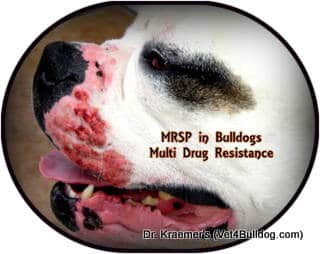
10. ANTI-YEAST RX (Malassezia) FOR BULLDOG ALLERGIES
If a secondary yeast infection is presented, antifungal medication is recommended
What is Your Bulldog and Fr. Bulldog Skin Barrier?
Your bulldog skin barrier is the outermost layer of the skin, known as the epidermis, which serves as a protective shield. This barrier plays a crucial role in maintaining the skin’s integrity and health by performing several important functions:
- PROTECTIVE BARRIER: The skin barrier defends against external environmental factors such as allergens, bacteria, fungi, parasites, and other harmful substances. It acts as a physical barrier that prevents these elements from penetrating the deeper layers of the skin.
- MOISTURE RETENTION: The skin barrier helps maintain proper hydration by preventing excessive water loss. It keeps the skin moisturized, which is essential for maintaining elasticity and preventing dryness and cracking.
- TEMPERATURE REGULATION: The skin barrier aids in regulating body temperature by controlling the evaporation of sweat and providing insulation.
- IMMUNE DEFENCE: The skin barrier contains immune cells that help detect and respond to potential threats, such as infections or allergens, by triggering an immune response.
In healthy bulldogs, the skin barrier is intact and effectively performs these functions. However, with bulldog allergies, skin conditions, or other health issues, the skin barrier can become compromised.
The breakdown of the barrier can make the skin more vulnerable to
- irritants
- allergens
- infections,
- bacteria
- yeast
Maintaining a healthy skin barrier is crucial for overall skin health
How Can I Repair My Bulldog Skin Barrier?
Maintaining your dog’s skin barrier and skin microbiome is essential for preventing skin issues, reducing the risk of infections, and promoting overall skin health. Here are some tips to help you care for your dog’s skin barrier and microbiome:
1. BULLY THERAPEUTIC SUPPLEMENTS
- Bully Essential fatty acids (omega-3 and omega-6)
- Bully Multivitamins and minerals.
- Bully Probiotics: Consider incorporating probiotics into your dog’s diet. Probiotics promote a healthy gut microbiome, which is closely linked to skin health.
- Bully Skin & Coat DermaCare
- Bully Itch & Allergy Formula
- Bully Immune Support
2. GROOMING FOR SKIN BARRIER WELLNESS
- Bathe your dog as needed, but not too frequently. Over-bathing can strip the skin of its natural oils, leading to dryness and irritation.
- Bath with our bully hypoallergenic shampoo and cream rinse conditioner
- Moisturizing, with our Oatmeal Aloe shampoo and conditioner
3. FLEA CONTROL
Use flea and parasite control products to prevent infestations, which can damage the skin barrier and disrupt the skin microbiome.
4. ENVIRONMENTAL CONTROL
Keep your bulldog’s environment clean and free from dust, mold, and other potential allergens.
5. BULLDOG CUSTOMIZED CARE
Your vet can recommend specific treatments, bully therapeutics, and dietary changes based on your dog’s individual needs.
Should I Use Steroids For my Bulldog Allergy
Steroids like pred can provide immediate relief from itching and help reduce inflammation, but they can also lead to serious adverse effects, particularly with long-term use or high dosages.
1. ENVIRONMENTAL ALLERGY
Bulldogs and French bulldogs itching due to atopic dermatitis are very responsive to cortisone (pred, Depo-Medrol, etc)
2. FOOD ALLERGY
Bulldogs treated with steroids to help relieve itch due to a dietary allergen might show no or limited improvement.
3. FLEA ALLERGY
Steroids provide good relief to flea allergy, but it is best to prevent the problem by using flea preventives rather than resorting to cortisone medication
4. CONTACT ALLERGY
Steroids provide good relief to most contact allergy itchin,g but it is best to remove or eliminate the offensive allergen (flea collar as an example)
What Steroid RX Side Effects Can My Bulldog Suffer From?
Steroids are widely used for pet allergies because they are inexpensive and generally effective in both reducing inflammation and controlling itching. However, they can also be harmful.
⚠️STEROID RISKS: The higher the dosage and the longer the use, the greater the risk.
Steroids like pred and Depo-Medrol can help alleviate and manage allergic itching. It is preferable to use them for flare-ups or short-term acute allergies. Prolonged use of steroids increases the likelihood of adverse side effects.
Here is a short list of some of the most common steroid side effects in bulldogs:
- Weak Immune System: will increase the chance for
- secondary bacteria
- yeast infection
- Demodex mites
- UTI
- intestinal dysbiosis.
- PU/PD: excessive drinking, thus uncontrolled urination and accidental indoor incontinence.
- OBESITY: due to an increase in food intake
- OTHER: many other serious medical conditions such as
- diabetes
- Cushing’s
- Liver steroid hepatopathy
- orthopedic problems
Bulldogs and French Bulldogs IMMEDIATE VS DELAYED ALLERGIES
The most common type of allergy is delayed hypersensitivity, where symptoms develop gradually over time.
Immediate hypersensitivity, though rare, can manifest as an instant, life-threatening anaphylactic shock.
1. DELAYED HYPERSENSITIVITY
The most common bulldog allergies are a delayed type of hypersensitivity and are milder in appearance (itch, swollen face, eyelid, hives, redness)
- TIMING: Delayed hypersensitivity bulldog allergy is often mild to moderate, and it can start hours after the encounter.
- SYMPTOMS: Mild to moderate, common manifestations are itch, swollen face and eyelid, hives,and redness
- TREATMENT: Mild to moderate cases can be treated with a bath and topical bully-medicated shampoos, conditioners, sprays, wipes, and gels.
More severe cases might require prescription medication such as steroids, antihistamines, and other itch-control drugs.
2. BULLDOG ANAPHYLAXIS
- TIMING: Instant and dramatic.
- SYMPTOMS: Constricted airways leading to
- difficulty breathing
- cyanosis (bluish discoloration of the skin due to lack of oxygen)
- circulatory collapse
- TREATMENT: Anaphylaxis can have severe consequences. In such cases, immediate emergency treatment is essential, preferably administered by a trained veterinary team, to prevent further complications and ensure the best possible outcome for the bulldog. Treatment includes:
- Epinephrine
- Oxygen
- IV fluid
- Monitoring
Itching Allergy in Bulldogs and French Bulldogs: TIPS & WARNINGS
Below is a selective list of allergy tips & warnings courtesy of Dr. Kraemer
#1 SKIN INFECTION TIP:
Secondary bacteria and yeast infections are common to ongoing uncontrolled allergies; they will exacerbate the itch and must be managed with topical antiseptics and anti-yeast medicated shampoos and gels like Dr. Kraemer’s Yeasty Bully Medicated products.
#2 THERAPEUTIC TOPICALS & SUPPLEMENTS TIP:
This should be implemented for any bulldog suffering from skin disease, allergy, and itching
Therapeutic bully topicals & supplements are step one for all itching, skin allergy bulldogs
#3 AIR PURIFIER & VENTILATION TIP:
Proper ventilation and purification can help reduce indoor allergens.
#4 BUSTER COLLAR TIP:
Keep an E-collar handy and place it on your pet till the itch is controlled to avoid self-trauma and additional injuries such as ear hematoma, hot spots, corneal ulcer, etc.
#5 STEROID MONITOR TIP:
Routine safety screens for pets using pred or other steroids should include blood tests and urine.
#6 STEROID TAPERING TIP:
Due to cortisone side effects, you and your vet should strategize tapering off the steroids’ itch control dosage to the minimum necessary.
#1 CORTISONE USE LEADING TO DEMODEX WARNING:
Subclinical demodicosis can erupt due to a steroid-induced immunosuppression
#2 NON ALLERGY ITCHING WARNING:
Remember, other skin conditions can cause itching and must be considered and ruled out. Examples are
#3 MRSP WARNING:
To effectively manage bacterial infections, it’s essential to use antibiotics and steroids judiciously. Treatment should be guided by cytology findings and how the dog responds to initial therapy.
Further evaluation, including bacterial culture and sensitivity testing, is necessary when there is limited response to treatment. This helps identify the specific bacteria and determine the most appropriate antibiotic.
🚨 This careful approach minimizes the risk of antibiotic resistance and ensures the best outcomes for bulldogs with bacterial infections.
Recommneded by Owners Approved by Bulldogs



